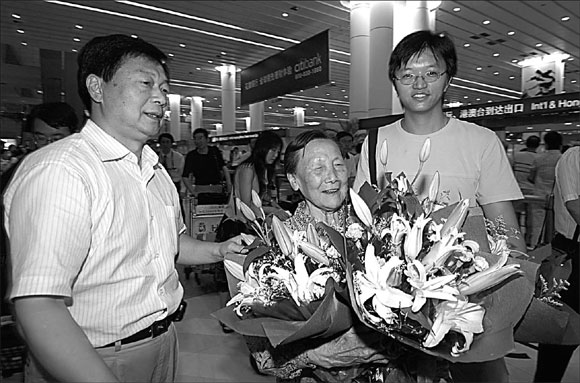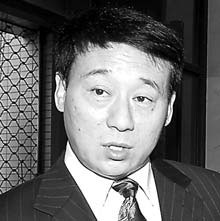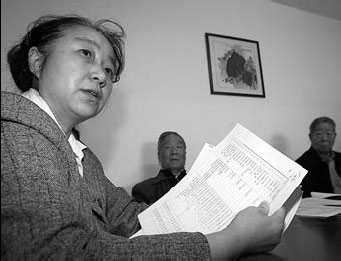Justice for all
|
Xia Shuqin (middle) is warmly received as she arrives in Shanghai on July 3, 2006, after a court appearance in Tokyo. Lang Congliu |
The defamation case filed by Nanjing massacre survivor Xia Shuqin against two Japanese authors and their publisher is the case that brought lawyer Tan Zhen both fame and pressure.
In December 1937, at the age of 8, Xia witnessed Japanese soldiers killing seven of her family members in the Nanjing Massacre. What Xia saw was just one horrific snapshot of a six-week period of looting, raping and killing.
The invading Japanese troops slaughtered at least 300,000 Chinese, most of them civilians.
The sufferings of the Xia family have been well documented, including John Magee's 105-minute documentary film and also the wartime diaries of John Rabe.
But in 1998, two Japanese writers, Toshio Matsumura and Shudo Higashinakano, cast doubts over Xia's account of being a massacre survivor.
Xia was deeply hurt by the accusation and sued the two writers and the publisher in the Nanjing Intermediate People's Court in November 2000.
Last month, after seven years of legal struggle, Japan's Tokyo District Court ruled that Toshio Matsumura and his book publisher pay 4 million yen ($34,800) as compensation to Xia for calling her account fraudulent.
"The success of our lawsuit confirms the existence of the Nanjing Massacre in the form of legal documents," says Tan Zhen, a lawyer with the Nanjing-based Fadeyongheng Law Firm which represented Xia in the lawsuit.
|
Tan Zhen has been helping Xia Shuqin in the law suits against the two Japanese authors and their publisher. Wang Chengbing |
The result is encouraging news for Chinese lawyers, who have launched more than 30 other compensation lawsuits, on behalf of Chinese civilians, against the Japanese invaders for their sufferings.
Prior to the November 2 verdict, the Japanese High Court had turned down dozens of appeals related to wartime compensation with the excuse that China had given up the right of individual claims in the treaties previously signed by the two governments.
People making the compensation claims included slave laborers, "comfort women", massacre and poison-weapon victims.
"The tone of the Japanese High Court means the court's door for compensation cases has closed, amid Japanese efforts to bury wartime memories," says Tan.
"Xia's case is an exception as it won in the form of a defamation case."
Tan and other Chinese law experts are challenging the excuse adopted by the Japanese High Court. The Supreme Court decided that the Joint Communiqu signed by China and Japan in 1972, or the Sino-Japanese Peace Treaty signed by Taiwan Province and Japan in 1952 (also called the Treaty of Taipei), waived the right of Chinese individuals to seek redress from the Japanese government or corporations.
"But the Joint Communiqu waived only the Chinese government's reparations claims against the Japanese government, while leaving the claim rights of private Chinese citizens intact," Tan says.
"The refusal by the Japanese High Court to receive our lawsuits signals that the Japanese government has irresponsibly withdrawn its responsibility in compensating the war victims hurt by the country 70 years ago."
Many Chinese and Japanese lawyers who have fought for the rights of massacre victims share Tan's view, and sense the gravity of the legal battle.
According to Chinese legal experts, it has been a common tactic for the Japanese government to shake off its responsibility for Japanese wartime crimes by turning down the cases under various excuses, such as "statutory time limit had expired" and "state immunity".
Chinese lawyers have been late in launching similar lawsuits compared with the wave of compensation cases launched by the Philippines and other countries against Japan.
The suits began in the 1990s, according to lawyer Kang Jian with Beijing-based Fangyuan Law Firm. She has been fighting against the Japanese government for compensation for Chinese comfort women.
Although the Chinese women's appeals were rejected, the former victims' appearances in Japan and their statements in court helped to some extent to make the history known to many Japanese, who had had no knowledge at all of these matters, says Kang.
"Victims stand up to tell their stories. Their experiences are so miserable that they cannot be invented. Many Japanese are shocked by their stories and thus begin to know about the past. Their opinions will gradually influence Japanese legislators," Kang says.
|
Kang Jian (left) helps some Nanjing Massacre survivors in their legal battle against the Japanese government in 2005. Li Fangyu |
In order to crack the present icy state of compensation lawsuits, Tan calls for related government bodies and social groups to unite in a bid to solve the dispute over individual compensation rights.
"There are many cases from other countries that we can draw on, in proving the absurdity of the tone of the Japanese High Court and safeguarding our rights for individual compensation claims," Tan says.
Wang Xuan, a lawyer who has fought against Japanese enterprises, which used Chinese forced labor, aims to set up a victims association and appeal to the United Nations Commission on Human Rights for having their voice heard in the international community.
The lawyers say they are not losing confidence and are seeing more support from both the Chinese and Japanese people.
The lawyers say they are moved by the victims, who have persisted with their lawsuits despite old age, and also by the Japanese people who are anonymously supporting their cause.
"They (the Japanese people) voluntarily came to hear the lawsuits and supported us on our parade. But you can find no one when you turn around and want to say thank you to them," Tan says.
(China Daily 12/18/2007 page20)

















